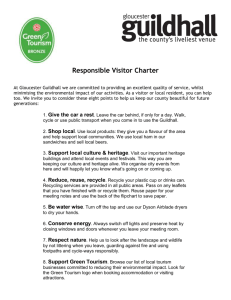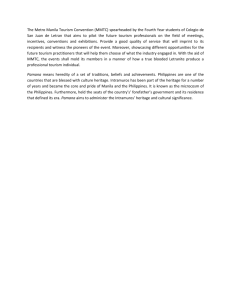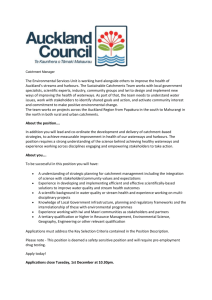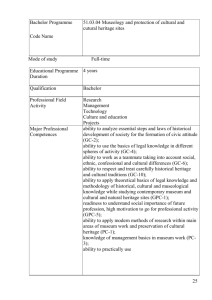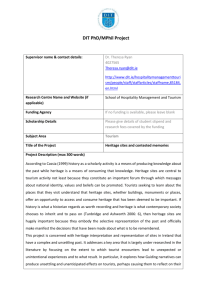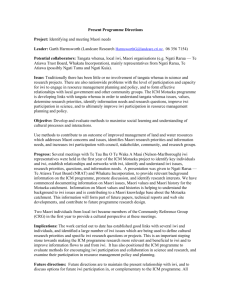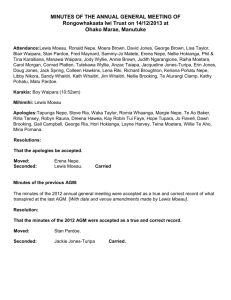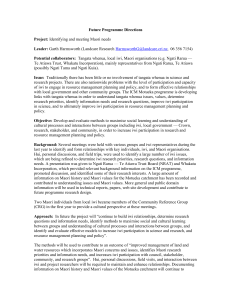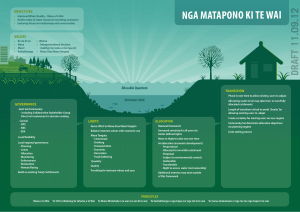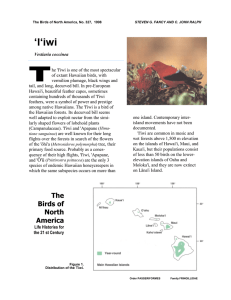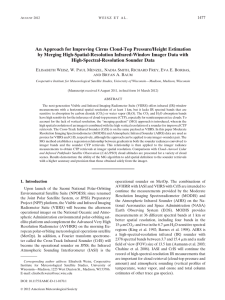John Coster Cultural Centre Conference
advertisement
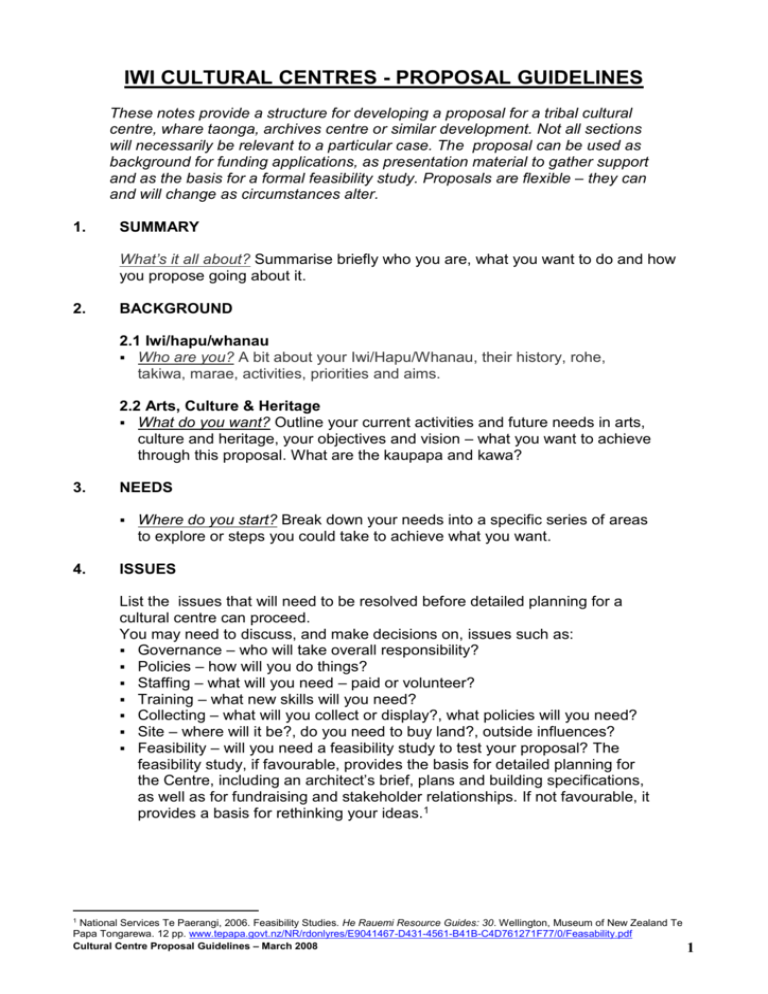
IWI CULTURAL CENTRES - PROPOSAL GUIDELINES These notes provide a structure for developing a proposal for a tribal cultural centre, whare taonga, archives centre or similar development. Not all sections will necessarily be relevant to a particular case. The proposal can be used as background for funding applications, as presentation material to gather support and as the basis for a formal feasibility study. Proposals are flexible – they can and will change as circumstances alter. 1. SUMMARY What’s it all about? Summarise briefly who you are, what you want to do and how you propose going about it. 2. BACKGROUND 2.1 Iwi/hapu/whanau Who are you? A bit about your Iwi/Hapu/Whanau, their history, rohe, takiwa, marae, activities, priorities and aims. 2.2 Arts, Culture & Heritage What do you want? Outline your current activities and future needs in arts, culture and heritage, your objectives and vision – what you want to achieve through this proposal. What are the kaupapa and kawa? 3. NEEDS 4. Where do you start? Break down your needs into a specific series of areas to explore or steps you could take to achieve what you want. ISSUES List the issues that will need to be resolved before detailed planning for a cultural centre can proceed. You may need to discuss, and make decisions on, issues such as: Governance – who will take overall responsibility? Policies – how will you do things? Staffing – what will you need – paid or volunteer? Training – what new skills will you need? Collecting – what will you collect or display?, what policies will you need? Site – where will it be?, do you need to buy land?, outside influences? Feasibility – will you need a feasibility study to test your proposal? The feasibility study, if favourable, provides the basis for detailed planning for the Centre, including an architect’s brief, plans and building specifications, as well as for fundraising and stakeholder relationships. If not favourable, it provides a basis for rethinking your ideas.1 1 National Services Te Paerangi, 2006. Feasibility Studies. He Rauemi Resource Guides: 30. Wellington, Museum of New Zealand Te Papa Tongarewa. 12 pp. www.tepapa.govt.nz/NR/rdonlyres/E9041467-D431-4561-B41B-C4D761271F77/0/Feasability.pdf Cultural Centre Proposal Guidelines – March 2008 1 5. SUPPORTING PROJECTS & RELATIONSHIPS List the people and organisations you have, or will need, relationships with in order to support your project, for example your own iwi runanga and komiti, kaumatua, Ministry for Culture & Heritage, Te Waka Toi, Te Papa Tongarewa National Services Te Paerangi, Museums Aotearoa, National Library Te Puna Matauranga, Lottery Grants Board, Te Maori Manaaki Taonga Trust, the National Digital Forum, local museums, territorial local authorities (particularly the one where the Centre will be sited). Who will support your training requirements? For example, iwi wananga, Te Paerangi, Massey University, the National Library’s National Preservation Office, the Alexander Turnbull Library’s Oral History Programme, individual museum conservators with skills in Maori material. What other projects are you involved in that will support this one or provide relevant skills? 6. PROPOSAL A detailed but concise statement of what your Centre will do and what physical buildings or spaces you will need. You will probably need specialist advice for particular functions, for example, whare taonga (museum adviser), performance space (sports/recreation adviser). Include a table setting out your requirements in terms of individual spaces, functions and floor areas. It is important to be clear on the amount of space you will need. The size and purpose of the building will determine its design and cost. 7. COSTS 7.1 Capital Costs Estimate the cost of your building either on the total area (for museum-style facilities, around $3000 - $5000 per square metre) or, if you have prepared sketch plans and a preliminary brief, you could get a quantity surveyor’s estimate. Include the cost of land, landscaping, parking provision and architect’s fees. This will be an expensive development, which you may not be able to fund on your own. The project may, however, bring benefits to the wider regional community and it is therefore reasonable to expect significant interest (and buy-in) from various community groups and stakeholders. As well as soliciting grants and donations, you could explore joint venture partnerships with stakeholders such as territorial local authorities to assist with resourcing and funding. Cultural Centre Proposal Guidelines – March 2008 2 7.2 Operational Costs You need to be realistic about the running costs of the building . You may also need professional staff to operate the building and programmes. Maintenance, depreciation, rates, power, communications, administration, collection care, exhibitions and salaries will be ongoing costs for which you must have a source of income. 8. FEASIBILITY STUDY You are now ready to undertake a feasibility study to assess the proposed Centre. This study should be carried out by independent consultants from the museum, tourism and /or business sectors. You will need to brief them clearly and be prepared to work closely with them to provide the information they need. The study might address some or all of the following issues: 1. Assessment and evaluation of existing examples of Iwi Cultural Centres, including overseas models; 2. Assessment and evaluation of existing tourism and cultural facilities within the region, which could have an impact on the proposal; 3. Consultation with whanau, hapu and iwi; 4. Relationships with stakeholders at local, national and, in some cases, international levels; 5. Appropriate governance structures, policies, staffing levels and training provisions; 6. Appropriate policies to guide the operation of the Centre, in particular, policies relating to Collecting, Collection Management, Intellectual Property, Confidentiality and Access; 7. Requirements of a safe storage facility, including building design, climate control, lighting, display facilities, fire safety and security; 8. Likely capital costs, including land purchase, construction, fit out and exhibition development; 9. Likely operating costs, including building maintenance, depreciation, occupancy costs, administration, collection care, exhibitions and salaries; 10. Potential capital funding sources, including donations and grants; 11. Potential ongoing operational funding sources, including retail and food outlets, with a relevant Business Plan; 12. Evaluation of possible sites and purchase costs, and identification of the favoured site; 13. Assessment and evaluation of the tourism potential and financial viability of your project if it might cater for local and international visitors; 14. Review and revision of your existing Arts, Culture and Cultural Heritage Strategic Plan (if you have one). For a major project you might need a range of expertise, broken down into the following, or similar, components: Cultural Centre Proposal Guidelines – March 2008 3 1. Museum consultant 2. Museum consultant + I/H/W staff Financial consultant Tourism consultant 3. 4. Elaboration of proposal - governance, policies, site options, building requirements, preliminary architect's brief, quantity surveyor's estimate, capital and operational costs, funding sources. Assessment and evaluation of existing cultural centre models, consultation within [Iwi/Hapu/Whanau], stakeholder communication and relationships. Business and/or fundraising plan. Evaluation of existing tourism facilities in region; evaluation and potential of your proposal; funding sources. Possible funding sources to help cover the cost of a feasibility study include a Lottery Grants Board Environment & Heritage Committee grant of up to $5000. Additional funding for aspects of the study may be available from NZ Trade & Enterprise,2 and the Ministry of Tourism.3 John Coster Heritage Management Consultant 29 Thorn Road Lower Kaimai, R.D.1 TAURANGA 3171 NEW ZEALAND Phone: +64-7-5433-229 Mobile: +64-274-760-817 Fax: +64-7-5433-872 E-mail: Coster@xtra.co.nz 2 www.nzte.govt.nz/ www.tourism.govt.nz/index.html Cultural Centre Proposal Guidelines – March 2008 3 4
